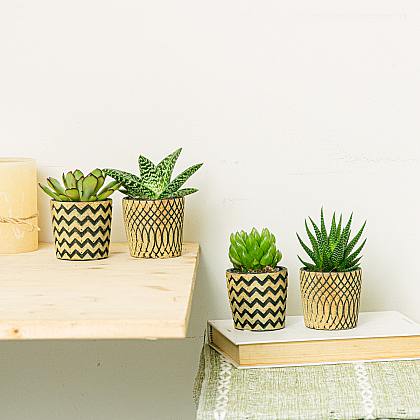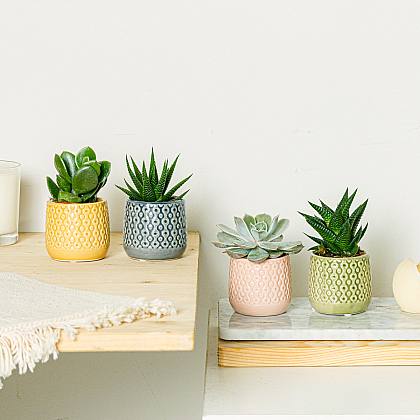Easy-care houseplants for pet owners: It's that easy
In this article, we will look at easy-to-care indoor plants for pet owners and give tips on how to safely and decoratively decorate the home with plants
The best low-maintenance houseplants for pet owners
Low-maintenance houseplants are a great option for pet owners who want to brighten up their home with green accents. These plants require less attention and are therefore ideal for people who are short on time or unable to take care of their plants much. However, when it comes to pets, it's important to know that not all houseplants are safe for them. Some plants can be poisonous and cause serious health problems. For this reason, it is advisable to select low-maintenance houseplants that are safe for pets. The best options include the green lily, the money tree, and the spider plant. These plants are not only non-toxic to pets but also easy to care for. They only require a small amount of water and do well even in areas with low light. In addition, houseplants offer many health benefits for humans and animals. They improve air quality, increase humidity, and can even reduce stress. To ensure that both pets and plants can live together harmoniously, some safety measures should be taken. This includes removing poisonous plants from the home or placing these plants out of reach of pets. So with a few simple tips for caring for houseplants in households with animals, you can create a green home that is both beautiful and safe.
Why are some plants dangerous to pets?
Some plants can be dangerous to pets because they contain toxic substances. When pets such as dogs or cats eat or chew on these plants, poisoning can result. Symptoms can range from vomiting and diarrhea to difficulty breathing and cramps, and in severe cases can even result in death. Some of the most well-known plants that are dangerous to pets include poinsettias, oleanders, philodendron, and ivy. These plants contain all toxic substances that can be dangerous to animals. It is important to note that not all plants are equally dangerous to all types of pets. While a particular plant may be safe for dogs, it can be very poisonous to cats. It's also important to consider that some pets may be more susceptible to poisoning than others. For example, young animals and animals with pre-existing conditions are more susceptible to poisoning by plants. It is therefore advisable to learn about the specific dangers of houseplants for your pet and ensure that you only have non-toxic plants in your home.
Safety measures for handling plants and pets
When choosing indoor plants for pet owners, it is important to follow safety measures to ensure the health and well-being of animals. Some plants can be poisonous and should therefore be placed out of reach of pets. It is advisable to learn about the potential toxicity of a plant before bringing it indoors. In addition, it is important to place indoor plants in such a way that pets cannot easily get to them. Higher shelves or hanging baskets are good options for keeping plants out of reach of curious paws. It is also advisable not to drop houseplant leaves or flowers near pet food or drinking vessels as they could potentially be poisonous. regular inspection of plants for damage or signs of poisoning is also important. If an animal shows signs of poisoning, a veterinarian should be visited immediately. By following these safety measures, pet owners can enjoy their houseplants while protecting their animals from potential hazards.
Tips for caring for houseplants in households with animals
If you have pets and want to care for houseplants in your home, there are a few tips that can help you create a safe environment for your animals. First, you should learn about the specific plants that can be poisonous to pets. Avoid such plants or make sure they are placed out of the reach of your animals. Another important measure is to check the plants regularly and remove dead leaves or flowers, as these are often more poisonous than healthy plant parts. Also make sure that your animals cannot nibble on the plants or knock them over. Some plants can cause allergic reactions in pets, so it is advisable to watch your animals and, if necessary, see a vet if there are any unusual symptoms. In addition, when watering your houseplants, you should make sure that there are no puddles, as stagnant water can be dangerous. Finally, you should also avoid using fertilizers or other chemical substances near your pets. By following these tips, you can keep both your houseplants and pets safe and healthy.
How to decorate your home with houseplants
Houseplants are not only good for the air quality in our homes, but they can also serve as decorative elements. If you want to decorate your apartment with indoor plants, you should first consider the type of room and the available light. For rooms with lots of daylight, plants such as ficus, monstera or rubber tree, which require a larger amount of sunlight, are suitable. For rooms with little daylight, you can opt for plants such as Zamioculcas, Sansevieria or Dragon Tree, which can thrive even in low light.
Another factor to consider is the size of the plant in relation to the room. Larger plants such as bamboo or palm trees can serve as a central element in a room, while smaller plants such as succulents or cacti are perfect for shelves or window sills.
If you want to decorate your home with indoor plants, you can also combine different types of plants to create a harmonious overall picture. Different colors and textures can add depth and interest to your space. For example, you can use a combination of hanging plants and upright plants to create a dynamic arrangement.
Overall, houseplants provide an easy way to decorate your home while improving air quality. By considering a few basic factors, such as light and size, and combining different types of plants, you can create an appealing and healthy green home.
Health benefits of indoor plants for humans and animals
Houseplants are not only a decorative addition to our homes, but they are also very beneficial to our health and that of our pets. Houseplants improve air quality through their ability to absorb carbon dioxide and release oxygen. Some plant species, such as bow hemp or green lily, can even filter harmful chemicals from the air and thus improve the indoor climate. In addition, houseplants can reduce stress levels and increase concentration. Studies have shown that looking at plants has a calming effect on the body and can help us relax.
But it is not only us humans who benefit from indoor plants, but also our pets. However, some plant species can be poisonous to pets and should be avoided. It's important to learn about potential hazards in advance and make sure our furry friends don't have access to poisonous plants.
Overall, houseplants are a simple and inexpensive way to promote human and animal health. They help create a pleasant indoor climate and can even help make our homes more sustainable.
Creating a green home: houseplants as part of a sustainable lifestyle
Creating a green home is an important part of a sustainable lifestyle. Houseplants can play a crucial role in this. They not only improve air quality but also help create a harmonious and relaxed atmosphere. Houseplants can also be kept safely in households with pets as long as certain precautions are taken. It is important to avoid poisonous plant species and instead choose easy-care houseplants that pose no threat to our beloved four-legged friends. The best easy-care houseplants for pet owners include green lily, money tree and bow hemp.However, caring for houseplants in households with animals requires some additional considerations. It is advisable to place the plants out of the reach of animals or to secure them with a grid or barrier. In addition, plant debris such as leaves or flowers should be removed regularly to prevent animals from accidentally eating them. In addition, it is important that the plants are not treated with toxic chemicals as they can be harmful to pets.
A green home with indoor plants not only offers aesthetic benefits, but also has positive effects on human and animal health. Houseplants improve air quality by filtering pollutants and producing oxygen. They can also reduce stress and increase overall wellbeing.
By incorporating houseplants into our homes, we can promote a sustainable lifestyle. Houseplants are an environmentally friendly way to beautify our spaces while making a positive contribution to nature. Not only are they easy to maintain, but they can also be an important part of our responsibility to the environment.
In this article, we looked at easy-care houseplants for pet owners. We have learned which plants can be dangerous to our animals and what safety measures we should take to make it easier for pets and plants to live together. We also gave tips on caring for houseplants and pointed out how you can decorate your home with plants. We also discussed the health benefits of houseplants for humans and animals, and the importance of plants for a sustainable lifestyle. Overall, it is important to be aware of which plants you can keep in a household with animals and which should be avoided. We hope this article has helped you make your home greener and more animal-friendly. As an open point for further consideration, we would like to encourage you to think about how we as a society can develop more awareness of the protection of animals and plants and how each and every one of us can contribute to this. Because this is the only way we can create a sustainable future for everyone


